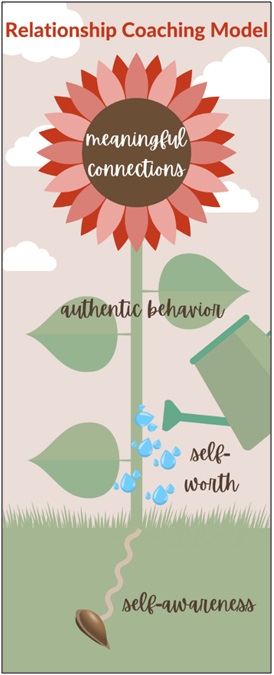A Coaching Model By Sara Kwon, Relationship Coach, UNITED STATES

 GARDEN Relationship Coaching Model
GARDEN Relationship Coaching Model
Clients:
This relationship coaching model supports my ideal clients: Adults, who are single or in relationships, who are feeling generally stuck in their pursuit of meaningful connection.
“Stuck” can mean many things – troublesome patterns, insecurity, fear of vulnerability or rejection, unclear desires or boundaries, resentment, lacking intimacy, and more.
GARDEN Model Theory:
Developing deeper self-awareness and self-worth leads to empowered, authentic behavior that is aligned with one’s goals and values, which leads to meaningful connections with others and a healthier relationship with oneself.
This model provides structure to create a safe environment for clients to explore their goals, values, beliefs, challenges, strengths, supports, and much more. The self-awareness and self-worth gained through this experience empower clients to confidently build practical action plans that are aligned with their genuine values, which, when coupled with intentional accountability, produce authentic behavior.
My coaching model is inspired by. Brené Brown’s Atlas of the Heart: Mapping Meaningful Connection and the Language of Human Experience. She writes,
Authenticity is a requirement for connection…
which speaks to the core objective of my model – to help my clients glean awareness that feeds into worth-driven authentic and purposeful behavior, which is essential to (re)build meaningful connections. Inauthentic behavior may still result in connection, but unfortunately, not the honest and intimate connection that generates fulfilling, resilient, empowering, and growth-nurturing relationships.
Brown also quotes the work of Relational-Cultural Theorist, Judith Jordan, sharing that
The need for connection in which growth is a priority is the core motivation in people’s lives. In growth-fostering relationships, people are able to bring themselves most fully and authentically into connection.
Not unexpectedly, the work that clients invest in coaching and the action plans that are created within the process also foster a stronger growth mindset. When prioritized and applied, this mindset supports an individual’s self-worth, empowerment, and overall self-management which encourages the growth of current relationships and/or serves as a foundation for future relationships.
Process: GARDEN
G – Goal
This is the foundational phase of a coaching session. In this phase, the client shares their intentions for the session, and the coach helps them to focus these thoughts and desires on a specific goal with realistic measures of success. In this goal-setting phase, the importance of the goal is established, and the client begins to unpack what needs to be addressed surrounding this topic/situation.
General questions:
- What will tell you that we have had a successful conversation today?
- What will tell you that you have achieved this goal?
- What will be different for you when you achieve this goal?
- What do you feel will be important to address in order to achieve this goal?
A – Awareness
Awareness and Reframe work in tandem. In the Awareness phase, the coach partners with the client to explore their current mindset as it relates to this goal, to cultivate awareness around their authentic values, underlying beliefs, strengths, and resources. This discovery phase also sheds light on challenges and obstacles to clarify what is really in the client’s way of achieving their goal.
General questions:
- What would the ideal situation be for you, in terms of successfully achieving your goal?
- What has been most challenging for you in your pursuit of this goal?
- What does [a mentioned word that stands out to the coach, such as success or failure] mean to you?
- How does this impact you?
- What about this [situation] makes you feel that way?
- What is in your control?
R – Reframe
As the client’s disempowering perspective(s) become more apparent, the coach will offer thoughtful questions with the intention of opening the client’s mindset to a more empowering perspective. This helps the client recognize that they are worthy and capable of seeing and doing things differently than they have before.
General questions:
- What else could be true?
- How else can you look at this?
- What might you be assuming?
- What could you do differently?
- What might you gain if you do something differently?
D – Developments
This is a check-in with the client to ensure that progress is being made toward the original goal, and highlight any notable shifts or learnings that will be helpful in moving forward. It is also an opportunity to explore other relevant information that has not yet come up organically.
General questions:
- How are you feeling regarding the progress you are making toward your goal thus far?
- What are you learning?
- What else would be helpful to explore?
- What else do you need?
- I noticed a moment of clarity there…what is coming for you?
E – Execute
In this phase, the client channels their enhanced awareness and empowerment into creating a specific, measurable, achievable, relevant, and time-bound plan of action. The coach ensures that it meets the SMART goals standards and that the client feels fully ready and supported to commit to this plan. Through this coaching process, the client is able to create a purposeful plan that aligns with their true values and priorities, cultivating increasingly authentic behavior as they continue to grow.
General questions:
- How will execute this plan of action support you?
- How will you know when you have accomplished this?
- What might be a potential obstacle in your effort to do this?
- What else might you like to consider as you move forward?
- What can you do to support yourself in taking this action?
N – Noteworthytakeaway(s)
This phase is an opportunity for the client to recognize themselves for new perspectives that were brought to light, and reflect upon the session as a whole. This ends the session on a productive and positive note – highlighting any important awareness that was brought to light, negative feelings that were alleviated, and reinforcing any notable shift that was made toward an empowering mindset.
General questions:
- How do you feel now compared to when we started the session?
- How would you like to recognize yourself?
- What was the biggest thing you learned today to support you in moving forward?
Closing:
The coach/client relationship is its own connection in and of itself; it is a partnership rooted in trust, vulnerability, and optimism that growth can take place. Coaching offers an opportunity for clients to feel seen and heard in a safe, supportive, and objective environment, and to translate that energy and awareness to current or future relationships.
Connection is the energy that exists between people when they feel seen, heard, and valued; when they can give and receive without judgment; and when they derive sustenance and strength from the relationship. Brené Brown, PhD, MSW Atlas of the Heart: Mapping Meaningful Connection and the Language of Human Experience
Learn How to Create Your Own Coaching Model
Your Coaching Model reflects your values,
philosophies and beliefs and must communicate who you will coach
and the problems you will solve. Read more about creating your coaching model
References
Brown, Brené.Atlas of the Heart: Mapping Meaningful Connection and the Language of Human Experience. Random House, 2021